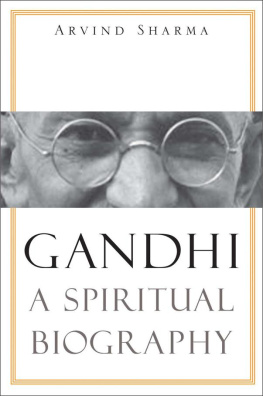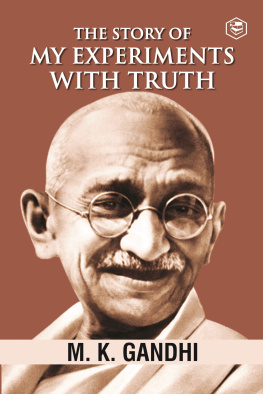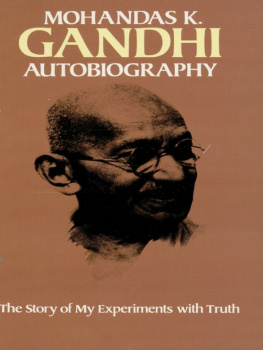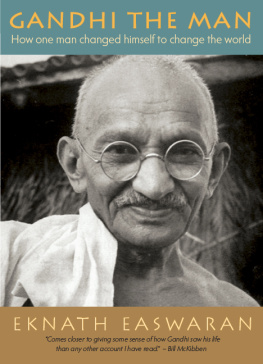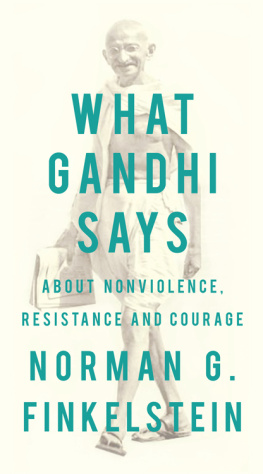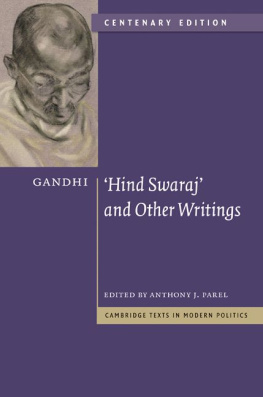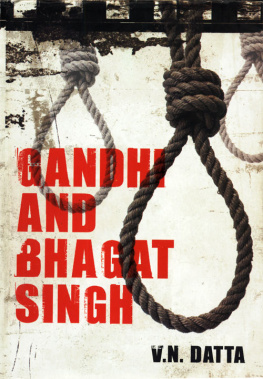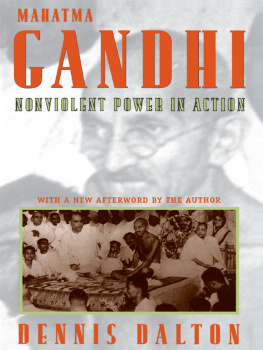gandhi
Arvind Sharma
gandhi
A Spiritual Biography
Yale UNIVERSITY PRESS
New Haven & London
Published with assistance from the foundation established
in memory of James Wesley Cooper of the Class of 1865,
Yale College.
Portions of I Found No Peace by Webb Miller are reproduced
by permission of the family of Webb Miller.
Copyright 2013 by Yale University.
All rights reserved.
This book may not be reproduced, in whole or in part, including
illustrations, in any form (beyond that copying permitted by
Sections 107 and 108 of the U.S. Copyright Law and except
by reviewers for the public press), without written permission
from the publishers.
Yale University Press books may be purchased in quantity for
educational, business, or promotional use. For information, please
e-mail sales.press@yale.edu (U.S. office) or sales@yaleup.co.uk
(U.K. office).
Designed by Lindsey Voskowsky.
Set in Sabon, Century Gothic, and Bondoluo Peek types
by Integrated Publishing Solutions.
Printed in the United States of America.
ISBN 978-0-300-18596-6
A catalogue record for this book is available from the Library of
Congress and the British Library.
Library of Congress Control Number 2013933796.
This paper meets the requirements of ANSI/NISO Z39.481992
(Permanence of Paper).
10 9 8 7 6 5 4 3 2 1
contents
gandhi
introduction
I
History is more than the biography of those who make it. Nevertheless, some people leave their mark on history in such an elusive way that historiography perpetually fails to capture it. Gandhi is surely one such figure. His life possesses a quality that exceeds all accounts of it, although more than four hundred published biographies exist. Hence one more book on Gandhi; and there is room for many more, without superfluity.
To be specific, this book is a spiritual biography of Gandhi (18691948), known as Mahatma Gandhi. The first part of the name Mahatma Gandhi, that is to say, the term Mahatma, is not a name but a title. Gandhis proper name was
Gandhi uses an evocative Sanskrit word in this passage, moksha, which literally means freedom. In the Hindu context it possesses a more concrete connotation, that of freedom from being reincarnated repeatedly in the mundane world where one is under the grip of ones passions. Gandhis biography gradually turns into history as he leads a nation to political freedom, or political moksha, as he marches toward his own spiritual moksha.
That Mahatma Gandhis name contains a title, namely Mahatma (great soul, a name given to saints in India), and that it doubles as his name, is not unique to him. The same is the case with two other famous names in history: Jesus Christ and Gautama Buddha. The word Christ means anointed one and is a messianic title, while the word Buddha is a title meaning enlightened one. These nominal facts lead to a substantial point and provide a clue to a very important dimension of the lives of these figuresthat they combined in themselves two dimensions: an ordinary one, which they might share with any human being, and an extraordinary one, which set them apart from other human beings. Jesus as Jesus was an ordinary Jew of Palestine, but in his role as Christ he stood apart from others as their redeemer. Gautama as Gautama was an ordinary prince, like many others in North India in the sixth century BCE, but as Buddha, he stood apart as the man who woke up while others slept. Similarly, Gandhi as Gandhi was a lawyer like so many others, but as Mahatma, his person became a vehicle through which he established new norms of human conduct.
This book addresses the Mahatma side of Gandhis personality. As we begin to do so, two points immediately catch our attention. The first is that although Jesus Christ and Gautama Buddha also emphasized morality, there was also a further claim of being the Messiah and the Son of God in the case of Jesus and of being an Enlightened person in the case of the Buddha. For Gandhi, however, morality and religion were synonymous, so a spiritual biography of Gandhi contains a remarkably strong moral component, strongly colored by theism, but still moral. The fact that his experiments with truth were carried out in public did not, for Gandhi, detract from their spiritual value. He wrote: There are some things which are known only to oneself and ones Maker. These are clearly incommunicable. The experiments I am about to relate are not such. But they are spiritual, or rather moral; for the essence of religion is morality.as spiritual beings having a human experience. Some aspects of Gandhis life may appear less puzzling when viewed in this light.
II
Anyone familiar with the life and work of Gandhi feels compelled to ask the following question at some point: What was the source of his strength, even power? In a way, this book is another attempt to answer this question. How is it that he could ask people to face blows from the police without retaliating, and they would be ready to do so? That he would ask women to court arrestand face the vicious uncertainty of finding themselves in the hands of an imperial police notorious for kicking people in the crotchand they would do so? That he would hint to Muslim women that they need not observe purdah in his presence, because he was like their father or brother, and they would comply? It is not that everyone acted as he asked, or as he wanted them to. Even his trusted colleagues let him down at critical times. To that extent, he was fallible and like the rest of us. What calls for an explanation is not that he failed at times; what requires an explanation is how he could succeed to the extent that he did. What was the source of his power of making heroes out of clay, as his political mentor, G. K. Gokhale, put it?
Some have traced the source of this power to personal attributes, to the fact that he practiced what he preached. This may be why some claim that what Alcibiades said of Socrates can be said of Gandhi: He is the only man who can truly make me feel ashamed.
Others have traced the source of this power to national factors and found its roots in his Indian background. One such person is Pandit Jawaharlal Nehru, Indias first prime minister, who wrote many years ago: He seems to be the vehicle
There have, however, been many national leaders before and after Gandhi, but there has been only one Gandhi. Most observers therefore have traced the source of his power to his spiritual beliefs, to what some consider the power of spirit over the material world. When Louis Fischer spent a week with Gandhi in 1942 and had a journalists gall to ask Gandhi himself for the secret of his success, Gandhi responded: I think my influence is due to the fact that I pursue the truth. That is my goal.... Truth... is not merely a matter of words. It is really a matter of living the truth.
Gandhi believed so fervently in the life of the spirit that he had only a handful of material possessions when he dieda watch, sandals, spectacles, and a few similar items.
Thus a ruler can imprison a persons body, but the spirit is incapable of being imprisoned (or, for Gandhi, of being killed). It was this spiritual leverage that Gandhi fastened on to, and we fasten on to in Gandhi. It was with this power that Gandhi faced the might of an empire. Gandhi used his confidence in the power of the soul to help liberate the colonially imprisoned bodies of millions of his countrymen and women. His science of Satyagraha was his way to protest in the name of truth or justice, or uphold truth or justice.
III
Biographies are usually chronological in nature, although it is also possible to probe certain dimensions or aspects of a persons life thematically. This account of Gandhis spiritual life is an attempt to blend these two approaches. The first part of the book relates the story of Gandhis life, focusing on the points at which it strikes a spiritual note; the ensemble these notes are part of emerges in the second part, where the melodies and harmonies are teased out. Roughly the first half of the book, up to , is essentially narrative in character, then, with occasional thematic forays; the second half is essentially thematic, though containing some narrative elements. The two approaches have been blended in the hope that the ensuing binocular vision provides a satisfying view of the range and depth of Gandhis spiritual life.
Next page
